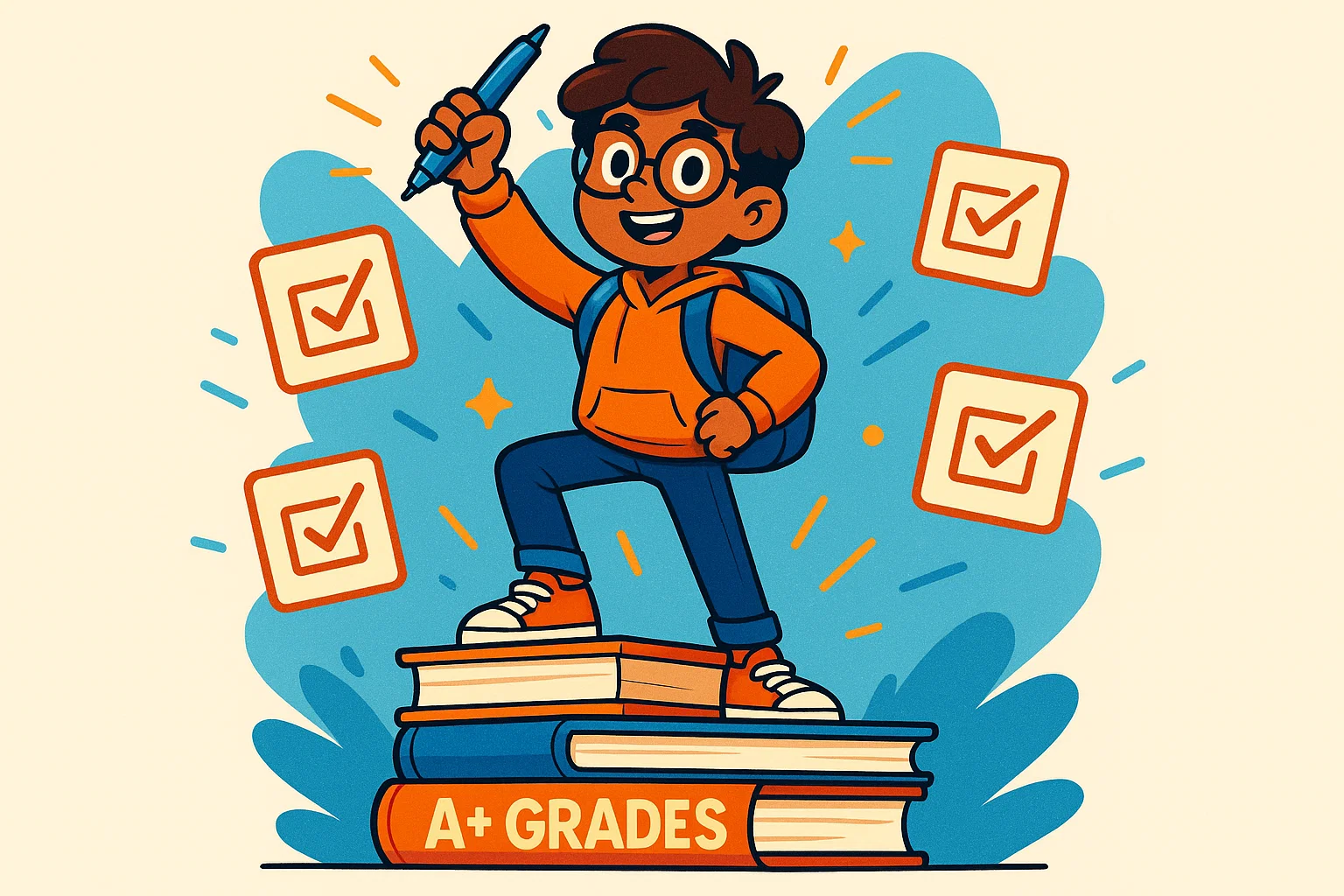Student life represents a critical period where the habits you form today shape the person you become tomorrow. Whether you’re navigating college life or managing the demands of high school, the daily choices you make compound over time, influencing not just your academic performance but your overall well-being.
Research from Duke University suggests that approximately 40% of our daily actions are driven by habit rather than conscious decision-making. This means that developing good habits early in your academic journey creates an autopilot system that propels you toward success without constant effort.
The Power of Habit in Student Life
Habits function as mental shortcuts that allow students to stay focused on what truly matters. When you automate essential behaviors like reviewing notes or maintaining a regular study schedule, you free up mental energy for deeper learning and creative problem-solving.
Consider how a simple habit—like always studying in the same location—can signal your brain that it’s time to concentrate. Students who develop these automatic patterns often find that staying on track becomes less of a struggle and more of a natural progression through their day.
The difference between students who excel and those who struggle often comes down to consistency, not intelligence. As James Clear, author of Atomic Habits, notes: “You do not rise to the level of your goals. You fall to the level of your systems.” Your habits form that system.
Developing Good Habits for Academic Excellence
Building good habits doesn’t require massive overhauls. Small, consistent actions create lasting change. According to a study published in the European Journal of Social Psychology, it takes an average of 66 days for a new behavior to become automatic—though this varies depending on the complexity of the habit.
The process of forming good habits involves three key elements:
- Cue: The trigger that initiates the behavior
- Routine: The actual habit you perform
- Reward: The benefit you gain, which reinforces the behavior
When you understand this loop, you can intentionally design habits that lead to academic success. For students, this might mean placing your textbook on your pillow (cue) to remind yourself to review before bed (routine), which improves retention (reward).
Academic Excellence Habits

Master Time Management
Effective time management stands as one of the most important habits for students seeking academic and personal success. Students often underestimate how much time tasks actually require, leading to last-minute cramming and unnecessary stress.
Creating a time management system:
Start by tracking how you currently spend your time for one week. You might discover that small time drains—social media checks, disorganized searches for materials—consume hours you thought were productive. Once you identify these patterns, you can implement strategies to reclaim that time.
| Time Management Strategy | Implementation | Expected Benefit |
| Time Blocking | Assign specific activities to fixed time slots | Reduces decision fatigue by 35% |
| Two-Minute Rule | Complete tasks under 2 minutes immediately | Prevents small task accumulation |
| Priority Matrix | Categorize tasks by urgency and importance | Ensures focus on high-impact activities |
The Pomodoro Technique offers a practical approach: work for 25 minutes, then take a 5-minute break. This method helps students stay focused while preventing burnout. Research from the University of Illinois indicates that taking breaks during study sessions can actually improve concentration and academic performance by up to 20%.
Set clear boundaries around your study time. Let friends and family know your schedule, put your phone in another room, and create an environment that supports concentration. Students who develop these time management habits early find they have more free time for activities they enjoy, not less.
Use Effective Study Techniques
Not all study time is created equal. Students often confuse time spent with material mastered. Spending eight hours rereading notes might feel productive, but active learning techniques yield far better results in less time.
Evidence-based study techniques include:
- Active Recall: Testing yourself on material without looking at notes forces your brain to retrieve information, strengthening memory pathways. This technique has been shown to improve long-term retention by up to 50% compared to passive review.
- Spaced Repetition: Rather than cramming, review material at increasing intervals. Study something today, then again in three days, then a week later. This approach aligns with how your brain naturally consolidates memories.
- Interleaving: Mix different subjects or types of problems in a single study session rather than blocking similar material together. While this feels harder initially, it leads to better grades on assessments.
- Elaboration: Connect new information to what you already know by asking yourself how concepts relate to each other or to real-world applications.
A Cornell University study found that students who used active learning techniques scored approximately half a letter grade higher than those who relied on passive study methods. The key is working smarter, not necessarily longer.
When planning study sessions, allocate time based on difficulty and importance rather than simply dividing hours equally among subjects. Tackle challenging material when your mental energy is highest—typically within the first few hours after waking.
Stay Organized
Organization might seem like a surface-level concern, but it directly impacts your ability to perform academically. Every minute spent searching for a misplaced assignment or scrambling to remember a deadline is time stolen from actual learning.
Digital and physical organization systems:
Create dedicated spaces for different aspects of school life. Use a planner—whether digital or paper—to track assignments, tests, and commitments. Research suggests that the act of writing things down (even if you never look at it again) improves memory and commitment to tasks.
For digital files, establish a consistent naming convention and folder structure. A system like “Year-Subject-Type-Date” (2025-Biology-Lab-0415) allows you to find any document within seconds. Students who stay organized report 30% less academic stress than their disorganized peers.
Physical organization matters too. Keep your backpack and study space tidy. Use folders or binders with clear labels for each subject. When everything has a designated place, you eliminate the cognitive load of constantly making decisions about where things should go.
Spend five minutes at the end of each day organizing your materials and planning the next day. This small investment pays enormous dividends in reduced stress and improved efficiency throughout your academic journey.
Consistent Reading
Regular reading expands your vocabulary, improves writing skills, and builds background knowledge that makes learning new concepts easier. Students who read regularly—even just 20 minutes per day—demonstrate stronger analytical thinking and perform better across all academic subjects.
The benefits extend beyond the classroom. Reading fiction, in particular, has been shown to increase empathy and emotional intelligence. A study published in Science found that reading literary fiction improves the ability to understand others’ mental states—a critical skill for building strong relationships.
Make reading a daily habit by:
- Carrying a book or e-reader with you
- Reading during natural transition times (waiting for appointments, commuting)
- Setting a specific time every day dedicated to reading
- Joining a book club or reading group for accountability
Don’t limit yourself to assigned readings. Explore topics that genuinely interest you. The goal is to make reading enjoyable so it becomes a habit you want to maintain. Students often discover that regular reading improves their concentration in other areas as well—your brain gets better at sustained focus through practice.
Review Daily Material Before Sleep
Your brain consolidates memories during sleep, making the period right before bed ideal for review. Students who briefly review their notes before sleeping show improved retention compared to those who study earlier in the day without pre-sleep review.
This practice doesn’t require lengthy study sessions. Spend just 10-15 minutes scanning through key concepts, formulas, or vocabulary. This process, called “priming,” prepares your brain to process and organize the information during sleep.
The science is compelling: a study in Psychological Science demonstrated that students who reviewed material before sleep and then slept for at least seven hours performed significantly better on tests than those who studied for the same amount of time but didn’t sleep or didn’t review before bed.
Combine this habit with adequate sleep hygiene—no screens for an hour before bed, a consistent sleep routine, and a cool, dark room—to maximize both the quality of your sleep and the retention of material.
Health and Wellness Habits

Prioritize Adequate Sleep
Sleep isn’t a luxury—it’s a biological necessity that directly affects cognitive function, mood, and academic performance. Students often sacrifice sleep to study or socialize, but this trade-off backfires. Research consistently shows that adequate sleep improves memory consolidation, problem-solving abilities, and creative thinking.
The National Sleep Foundation recommends that teenagers get 8-10 hours of sleep per night, while young adults need 7-9 hours. However, surveys indicate that approximately 70% of college students fail to meet these recommendations regularly.
The real cost of sleep deprivation:
Sleep-deprived students experience difficulty concentrating, increased irritability, and impaired judgment. A study from Harvard Medical School found that students who maintained healthy sleep patterns had a 15% higher GPA on average compared to those who consistently got less than six hours per night.
Dr. Matthew Walker, neuroscientist and author of Why We Sleep, states: “The shorter your sleep, the shorter your life span.” While dramatic, this highlights that the impact of sleep extends far beyond academic performance to overall well-being.
Create a sleep routine by going to bed and waking up at the same time daily—even on weekends. This consistency helps regulate your body’s internal clock. If you struggle to fall asleep, try deep breathing exercises or progressive muscle relaxation to signal your body that it’s time to rest.
Maintain a Healthy Lifestyle
A healthy lifestyle encompasses multiple habits that work synergistically to support your academic and personal goals. Physical health directly influences mental performance. Students who develop these positive habits often find improvements not just in grades but in energy levels, mood, and resilience.
Key components include:
- Hydration: Your brain is approximately 75% water. Even mild dehydration can impair concentration and cognitive function. Keep a water bottle with you and aim for 8-10 glasses daily.
- Limiting Screen Time: Excessive screen exposure, particularly before bed, interferes with sleep quality and can contribute to eye strain and headaches. Use the 20-20-20 rule: every 20 minutes, look at something 20 feet away for 20 seconds.
- Stress Management: Chronic stress impairs memory and learning. Techniques like meditation, journaling, or talking with trusted friends help maintain emotional well-being.
Students who develop a healthy lifestyle early establish patterns that extend well beyond the classroom, forming the foundation for a fulfilling life. The habits you build now become the default settings for adulthood.
Eat Healthy
Nutrition profoundly affects cognitive function. Your brain consumes approximately 20% of your body’s energy, so what you eat directly impacts your ability to concentrate, learn, and perform academically.
Brain-boosting foods include:
- Omega-3 fatty acids (salmon, walnuts, flaxseeds) support brain structure and function
- Antioxidant-rich foods (berries, dark chocolate, leafy greens) protect brain cells from damage
- Complex carbohydrates (whole grains, sweet potatoes) provide steady energy without crashes
- Protein (eggs, lean meats, legumes) supplies amino acids necessary for neurotransmitter production
Students often resort to quick, processed foods due to time constraints or budget limitations. However, simple meal prep—dedicating an hour on Sunday to prepare healthy snacks and meals—ensures that students have nutritious options readily available during busy weeks.
Eating healthy doesn’t mean perfection. It means making better choices most of the time. Replace sugary snacks with fruit, swap soda for water or herbal tea, and include vegetables with at least one meal daily. These small changes compound over time to create significant impacts on academic performance and overall health.
Avoid skipping breakfast. Research from the American Dietetic Association indicates that students who eat breakfast demonstrate better concentration, problem-solving abilities, and test scores than those who skip this meal.
Take Regular Breaks
Working continuously without breaks actually decreases productivity and increases errors. Your brain needs periodic rest to maintain optimal performance. Taking breaks during intense work isn’t a sign of laziness—it’s a strategic approach to staying focused and effective.
The science supports this: a study published in Cognition found that brief diversions from a task can dramatically improve one’s ability to focus on that task for prolonged periods. Participants who took breaks every hour maintained consistent performance, while those who worked continuously showed declining accuracy and productivity.
Effective break strategies:
- Take a 5-10 minute break every 50-60 minutes of study
- Move your body—stretch, walk, or do light exercise
- Look away from screens to reduce eye strain
- Step outside if possible; exposure to nature reduces mental fatigue
- Avoid scrolling social media during breaks; this doesn’t allow your brain to truly rest
Students who incorporate regular breaks into their study plan report feeling less overwhelmed and more capable of maintaining concentration throughout study sessions. The key is scheduling breaks proactively rather than waiting until you’re already exhausted.
Regular Exercise to Help Students
Physical activity isn’t just about physical health—it’s one of the most powerful habits for enhancing cognitive function. Regular exercise increases blood flow to the brain, stimulates the growth of new brain cells, and releases chemicals that improve mood and reduce stress.
Research from the University of British Columbia found that regular aerobic exercise appears to boost the size of the hippocampus, the brain area involved in verbal memory and learning. Students who engage in physical activity at least three times weekly show improved academic performance compared to their sedentary peers.
You don’t need to become an athlete. Even moderate activity—30 minutes of brisk walking, dancing, swimming, or cycling—provides significant benefits. The Centers for Disease Control and Prevention recommend that young adults get at least 150 minutes of moderate-intensity aerobic activity weekly.
Making exercise a habit:
- Choose activities you genuinely enjoy
- Schedule exercise like you would a class—make it non-negotiable
- Find an exercise partner for accountability
- Start small and gradually increase intensity
- Incorporate movement throughout the day (take stairs, walk while on phone calls)
Exercise also serves as a healthy stress reliever. When academic pressure builds, a workout session can provide perspective and mental clarity. Many students report that their best ideas come during or immediately after physical activity when their mind has a chance to wander freely.
Personal and Interpersonal Habits

Practice Self-Reflection
Self-reflection allows you to assess your progress, identify areas for improvement, and maintain alignment between your actions and long-term goals. Students who regularly reflect on their experiences develop greater self-awareness and make more intentional decisions.
Set aside time weekly—perhaps Sunday evening—to review what went well and what you’d like to improve. Ask yourself:
- What did I accomplish this week?
- Where did I struggle, and why?
- What lessons can I extract from challenges I faced?
- Am I making progress toward my goals?
- What will I do differently next week?
This practice doesn’t require elaborate journaling. Even five minutes of honest reflection can provide valuable insights that help you course-correct and stay on track with your academic journey.
Self-reflection also includes recognizing and celebrating small wins. Personal development happens gradually. Acknowledging progress—even incremental improvement—builds momentum and motivation.
Dr. Carol Dweck’s research on growth mindset demonstrates that students who view challenges as opportunities to learn and who reflect on their strategies develop greater resilience and achieve higher levels of success than those with fixed mindsets who avoid self-examination.
Ask Questions
Curiosity drives learning. Students who ask questions demonstrate engagement, clarify misunderstandings before they compound, and often discover connections that deepen their understanding. Yet many students hesitate to ask questions, fearing they’ll appear uninformed.
The reality is that professors and teachers value questions. They signal intellectual engagement and often reveal misconceptions that other students share but haven’t voiced. A Stanford University study found that classrooms with higher rates of student questions showed improved comprehension scores across the entire class.
Developing the question-asking habit:
- Write down questions as they occur during lectures or readings
- Approach instructors during office hours—they’re specifically designated for student questions
- Form or join study groups where questioning is encouraged
- Remember that “I don’t understand” is a perfectly valid starting point
- Reframe fear: asking questions is a sign of intellectual courage, not weakness
Questions also help students stay engaged during lectures. The act of formulating a question requires you to actively process information rather than passively receiving it. This active engagement significantly improves retention and understanding.
Be Kind to Others
Kindness might seem disconnected from academic success, but building strong relationships creates a support network that enhances overall well-being and provides resources when challenges arise. Students who cultivate positive interactions with peers, instructors, and staff create an environment conducive to learning and personal growth.
Small acts of kindness—holding a door, offering to share notes with someone who was absent, expressing genuine appreciation—create ripples that return to benefit you. Research in positive psychology shows that performing acts of kindness increases happiness and life satisfaction for the giver as well as the recipient.
In academic settings specifically, kindness facilitates collaboration. Study groups, project partnerships, and peer feedback become more effective when students approach these interactions with generosity and respect. Professors are also more likely to provide extra help or opportunities to students who demonstrate consideration and professionalism.
Beyond pragmatic benefits, kindness simply makes school life more enjoyable. The relationships you build during your academic years often extend well beyond the classroom, potentially becoming lifelong friendships or professional connections.
Be Punctual
Punctuality demonstrates respect for others’ time and reflects your commitment to responsibilities. Students who consistently arrive on time for classes, meetings, and appointments build a reputation for reliability that opens doors throughout their academic and professional lives.
Chronic lateness creates stress—both for you and others affected by your tardiness. It also means you miss important information, as many instructors begin classes with announcements, context-setting, or key concepts.
Strategies for punctuality:
- Set reminders 10-15 minutes before you need to leave
- Prepare materials the night before
- Build in buffer time for unexpected delays
- Place clocks slightly ahead if you tend to underestimate travel time
- Treat scheduled commitments with the same seriousness you would a job
Being punctual is especially important for students balancing multiple commitments. When you’re on time, you avoid the domino effect where one delayed event throws off your entire schedule. This reliability allows you to maintain the consistent routines that support other positive habits.
Identify and Change Bad Habits
Everyone develops bad habits—the key is recognizing them and implementing strategies to replace them with behaviors that support your goals. Common bad habits for students include procrastination, excessive social media use, poor eating patterns, or negative self-talk.
The process for changing bad habits:
- Identify the specific habit: Be precise about what behavior you want to change. “I procrastinate” is vague; “I watch YouTube instead of starting assignments until the night before they’re due” is specific and actionable.
- Understand the trigger: What prompts the bad habit? Boredom? Stress? A specific time of day? Once you identify the cue, you can address the root cause.
- Replace, don’t just eliminate: Trying to stop a behavior without replacing it rarely works. If you habitually check your phone when stressed, substitute a healthier stress-relief technique like deep breathing or a brief walk.
- Remove temptation: Make bad habits harder to engage in. If social media distracts you, use website blockers during study time. If unhealthy snacks tempt you, don’t keep them in your room.
- Track your progress: Awareness itself often reduces bad habits. Use a simple tracker to note each day you successfully avoid the behavior or practice the replacement.
According to research on habit change, the average person who successfully breaks a bad habit attempts the change between 5-7 times before achieving lasting results. This means setbacks are normal. What matters is persistence and learning from each attempt.
For procrastination specifically—one of the most common challenges students face—try the “just start” approach. Commit to working for only five minutes. Often, beginning is the hardest part; once you’ve started, momentum makes continuing easier.


